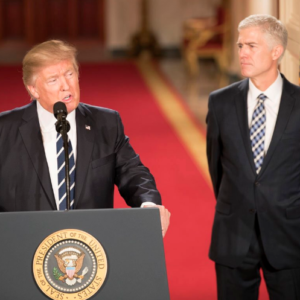Americans look to the Supreme Court to protect constitutional rights and rein in the president or Congress when either is not complying with the law. The first few days of Trump’s administration alone have demonstrated the importance of constitutional checks and balances.
In his first week in office, President Trump issued an order banning nationals from seven majority Muslim countries from entering the United States—an order that several judges have halted because of concerns about its constitutionality. The president fired the acting attorney general after she refused to defend Trump’s discriminatory policy, and now his administration may be defying court orders barring enforcement of this ban. To top it all off, President Trump is facing a lawsuit claiming that he is violating the Constitution by owning businesses that receive money from foreign governments.
The Trump White House would like to pretend that this is politics as usual, but it’s not. The American people—many of whom are now protesting Trump’s actions throughout the country—are asking whether the new president will ignore the Constitution’s limits on his power. Despite these looming constitutional crises, Republicans have shown that they will not act as a check on the executive branch. With Congress marching to Trump’s orders, the Supreme Court will be crucial to reigning in the new president.
On January 31, President Trump nominated Judge Neil Gorsuch, a judge with an extremist philosophy, to the Supreme Court. Unsurprisingly, the same Republican senators who spent a year blocking President Obama’s moderate, eminently qualified Supreme Court nominee pledged to move forward quickly with Trump’s choice. Democratic senators are rightly exercising their constitutional duty to advise and consent by demanding the nominee answer tough questions about his record, independence, and philosophy.
Judge Gorsuch is way out of step with the values and views of the American people. For instance, Judge Gorsuch has complained about progressives fighting for “social goals” like marriage equality through the courts. At this crucial moment in our nation’s history, we need justices who will not criticize historically marginalized groups for turning to the courts to protect their rights.
Judge Gorsuch may also be on board with Trump’s deregulatory agenda. In fact, he has argued for giving unelected federal judges more power to strike down regulations that protect consumers or ensure clean air and water—a view that is way outside the legal mainstream and established precedent. Judge Gorsuch’s approach would be bad for the environment, but good for the polluters who oppose environmental regulations.
Gorsuch’s record also suggests that he would likely continue the Supreme Court’s trend of ruling in favor of corporations and against American workers. Judge Gorsuch has ruled against employees in several dissents, including his vote to throw out a fine against a company that failed to properly train a worker who died in an accident. He also voted to reject a female truck driver’s discrimination claim and wanted to overturn an award of back pay for workers whose bosses improperly reduced their wages.
Judge Gorsuch twice ruled to limit female workers’ access to healthcare insurance that covers contraception. He ruled that for-profit corporations can have a right to religious freedom that trumps employees’ rights to contraception coverage under the Affordable Care Act. The Supreme Court later affirmed his ruling, but Judge Gorsuch has suggested that he would take this principle even further.
That is not the only reason for women’s health advocates to worry. Judge Neil Gorsuch wrote a book in 2009 that included broad language about the sanctity of life. It attacked the legal principles that are the foundation of Roe v. Wade—the landmark Supreme Court decision that affirmed a women’s constitutional right to abortion—without directly criticizing the ruling.
The tenure of a Supreme Court justice can span decades. At 49 years old, Judge Gorsuch is the second youngest Supreme Court nominee in history, meaning that, if confirmed, he would long play an integral role in shaping Americans’ constitutional rights. Trump himself noted that a Supreme Court justice can have “permanent” influence on the law.
President Trump—who received 3 million fewer votes than his opponent—does not have a sweeping mandate for his pro-polluter and anti-worker agenda, nor for his Supreme Court nominee. A judge who sits on the U.S. Supreme Court must reflect the values of the American people. Now more than ever, this person must also serve as a steadfast check on the other branches of government when they violate the Constitution.
Judge Neil Gorsuch does not satisfy this test.

